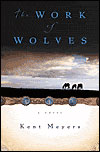book
The Work of Wolves
by Kent Meyers '80 :: Harcourt Books :: Reviewed by Brian Ames '85

Reading Kent Meyers's The Work of Wolves reminded me of a time when I loved horses. To watch them gallop, to see them stoop and eat grass, to feel their breath as they'd nuzzle my hand for oats. To sense in them an innate sovereignty that people in our century seem sometimes to have abandoned.
Which is why this story of South Dakota's iron landscape, compassion battling possessive hatred, and the plight of three horses, appeals so.
Stoic rancher's son Carson Fielding takes a job he doesn't want teaching an obsessively arrogant man's wife to ride. Over the course of her training they fall into a kind of love: although unconsummated, an affair of the heart. Convinced he has been cuckolded, the husband fences in the training horses with no food or water and waits for them to die. Winter backs the tale of their liberation by Carson, his Indian friend Earl Walks Alone, Earl's cousin Ted, and a German foreign-exchange student, Willi. In The Work of Wolves, Meyers ('80 Engl.) tends not only to the horses' ultimate freedom, but as well to the private demons haunting each of the young men as they struggle to do right in the presence of a cruel and controlling hatred that at times invokes the Aryan pogroms of Willi's grandmother's Fatherland.
Meyers is a great storyteller. Though in places his novel is over-engineered—its story might have been told in two-thirds the pages—his evident joy in the writing craft carries the reader along. Western author Larry McMurtry is often—and deservedly so—lauded for superb character development; Meyers is similarly gifted. Too, Meyers's descriptions of land-, mind-, and mood-scape are as spot on as any I've read.
As in Bob Dylan's song "Everything is Broken," settling down about The Work of Wolves is a sense that there is much fractured about life: it is a topography of busted things—tools, relationships, junk cars, horses. Carson and his father are working on a Case tractor. "What's wrong with that ram?" Carson asks. "Leaking," says his father. "Have to buy a new one, maybe. Never ain't something breaking down." Carson agrees. Later, his father ponders, "It gets old don' it—this always fixin' things."
Yet this stark, magnetic timbre is precisely what makes the climax of a kind of spiritual flight possible. Mercy trumps hatred. Care defeats small-mindedness. Carson, Earl, Willi, and Ted do the work of wolves.
The horses are free. As all horses must be.
— Brian Ames '85, author of Smoke Follows Beauty (Pocol Press, 2002), Head Full of Traffic, (Pocol Press, 2004),and Eighty-Sixed (Word Riot Press, 2004).